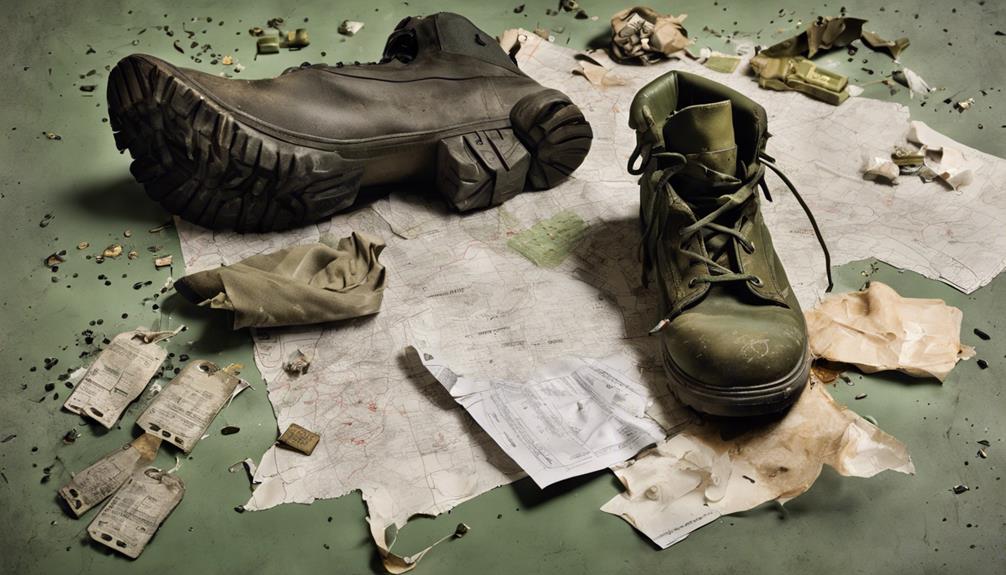When you're immersed in the chaos of war, soldiers often rely on a secret language to cope with the stresses of combat, and one phrase that encapsulates the frustrations and resilience of military life is 'BOHICA,' an acronym that stands for 'Bend Over, Here It Comes Again.' Emerging during World War II, BOHICA represents a sense of resignation and frustration, born from the harsh realities of war. It's a phrase that resonates with the constant pressure to perform, the struggle to balance duty and family life, and the mental toll of combat. You're about to uncover the fascinating story behind this phrase.
Origins of Military Slang
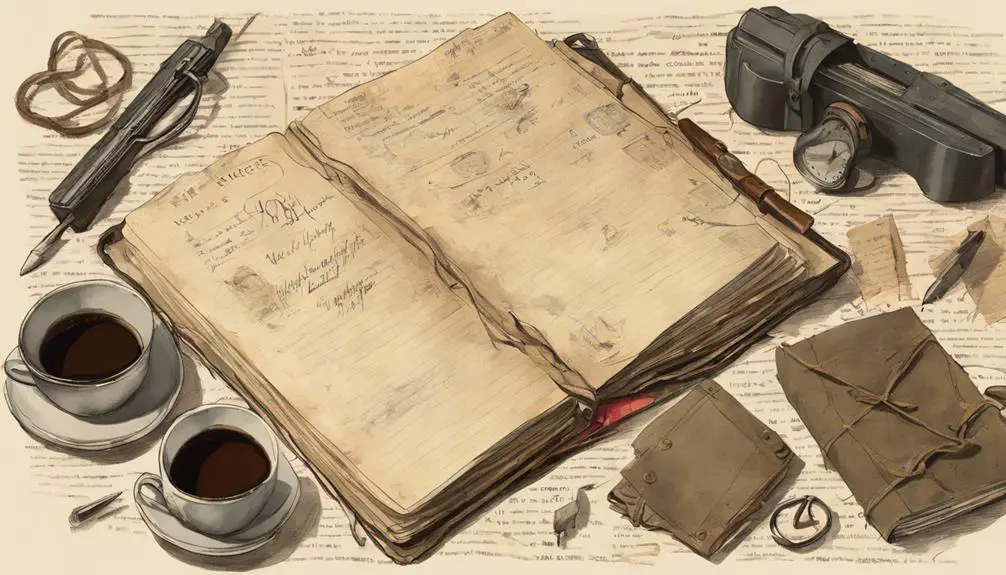
How did military slang evolve, and what factors contributed to its development in the first place?
As you explore the world of military slang, you'll notice that it's not just a collection of random words and phrases. Instead, it's a unique linguistic system that has evolved over time through a process of cultural exchange and adaptation.
You see, military slang is a product of linguistic evolution, shaped by the cultural exchange between soldiers from diverse backgrounds. During times of war, soldiers from different regions and countries come together, bringing with them their unique dialects, accents, and slang.
As they interact, they exchange words, phrases, and ideas, which eventually become part of a shared military lexicon. This cultural exchange has been a driving force behind the development of military slang. It's an indication of the adaptability and creativity of soldiers, who've consistently found ways to communicate effectively in high-stress environments.
The Birth of BOHICA
In the midst of World War II, a peculiar acronym emerged among American soldiers, one that would eventually become an integral part of military slang: BOHICA, an abbreviation that stands for 'Bend Over, Here It Comes Again.'
You might be wondering how this phrase came to be. As you explore the war diaries of soldiers who fought during WWII, you'll notice a common thread – the struggle to cope with the harsh realities of war. Boot camp, in particular, was notorious for pushing recruits to their limits.
It's no surprise, then, that a phrase like BOHICA would emerge as a way to express the sense of resignation and frustration that came with dealing with the constant barrage of orders, drills, and criticisms. The phrase became a way for soldiers to commiserate and find humor in the chaos that surrounded them.
As you investigate the origins of BOHICA, you'll discover that it's more than just a phrase – it's a tribute to the resilience and camaraderie of soldiers in the face of adversity.
Military Life in a Nutshell
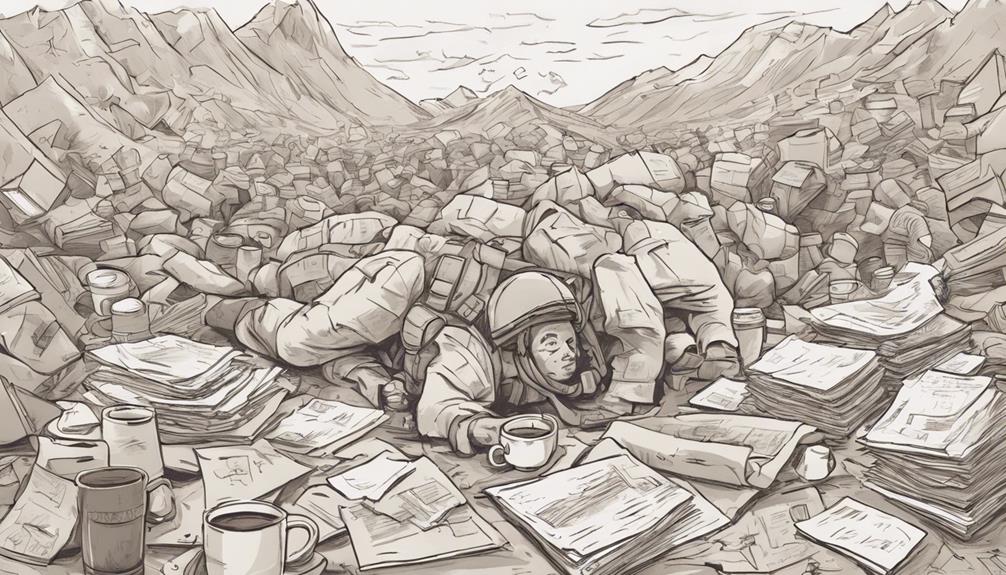
In the trenches of military life, BOHICA encapsulates the constant barrage of orders, drills, and criticisms that test your endurance and push you to your limits. You're constantly exploring the new situations, adapting, and making sacrifices for the sake of the mission. It's a life of discipline, sacrifice, and resilience.
As you navigate this complex web of military life, you'll encounter:
- The relentless pressure to perform, where one misstep can have serious consequences
- The struggle to balance duty and family life, leaving Warrior Wives to hold down the fort
- The mental and physical toll of combat, where the sounds of war linger long after the battle is won
- The constant need to adapt, to evolve, and to overcome, developing a Military Mindset that's both flexible and unyielding
In this world, BOHICA is more than just a phrase – it's a state of mind, a way of life that's equal parts challenging and rewarding.
As you explore deeper into the trenches, you'll find that BOHICA is the unsung hero, the battle cry that fuels your resolve and drives you forward, no matter what.
Coping Mechanisms of War
Your coping mechanisms are forged in the crucible of war, where the constant threat of danger and uncertainty demands adaptable strategies for survival and sanity.
As you navigate the unpredictable landscape of combat, you develop tactics to manage the emotional toll of war. War Weariness, a state of emotional exhaustion, sets in when the prolonged exposure to violence and trauma takes its toll. You may experience fatigue, irritability, and detachment – all symptoms of Battle Fatigue.
To cope, you rely on humor, camaraderie, and mental compartmentalization to maintain a sense of normalcy amidst chaos. You create mental shields to protect yourself from the psychological burden of witnessing atrocities. You form strong bonds with fellow soldiers, relying on each other for emotional support and validation.
These coping mechanisms become essential tools in your arsenal, enabling you to persevere in the face of unimaginable adversity.
Slang as a Survival Tool
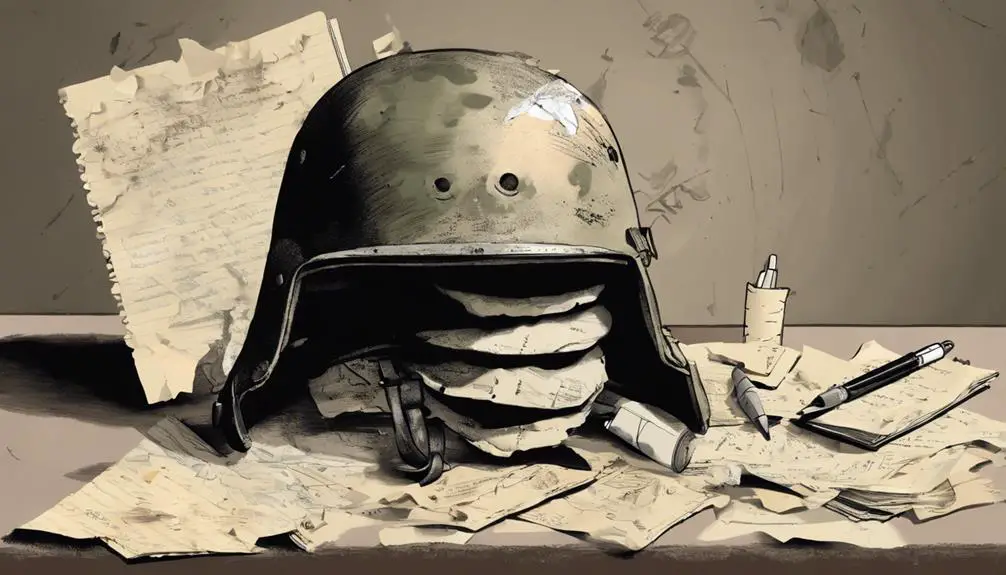
You adopt military slang as an essential component of your survival toolkit, using colloquialisms and abbreviations to convey complex information quickly and discreetly in high-stress environments. In the chaos of war, clear communication is important, and military slang provides a shared language that fosters unity and understanding among troops.
In this context, slang becomes a key tool for emotional expression, allowing soldiers to convey complex emotions and ideas quickly and efficiently. It's a way to convey cultural identity, bonding over shared experiences and inside jokes that create a sense of belonging.
Here are just a few ways military slang serves as a survival tool:
- It facilitates quick decision-making, allowing troops to respond rapidly to changing situations.
- It provides a sense of comfort and familiarity, evoking a sense of home and cultural identity in foreign environments.
- It allows soldiers to express emotions and frustrations, providing a much-needed release valve for pent-up feelings.
- It creates a sense of camaraderie, forging bonds between troops that can mean the difference between life and death.
Humor in the Trenches
Amidst the chaos and uncertainty of war, humor becomes an essential coping mechanism, allowing soldiers to momentarily escape the harsh realities of their environment and find levity in the darkest of times.
You may have heard war jokes that seem callous or insensitive to outsiders, but to those serving on the front lines, they're a way to poke fun at the absurdity and chaos surrounding them. Dark satire, in particular, becomes a crucial tool for soldiers to confront the bleakness of their situation head-on.
By making light of the most dire circumstances, you're able to momentarily forget the horrors of war and find some semblance of normalcy. This gallows humor serves as a pressure valve, releasing tension and anxiety built up from the constant threat of danger.
In the trenches, humor is an indispensable component of survival, allowing soldiers to momentarily suspend their fears and find comfort in the camaraderie of their fellow comrades.
Latrine Walls and Lore
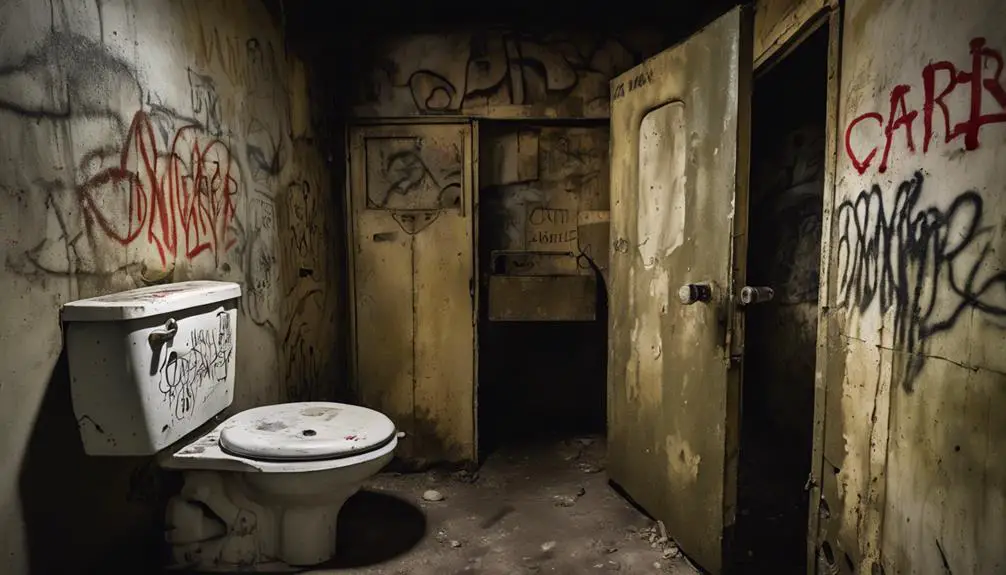
In the confines of military latrines, a peculiar form of folklore emerges, as soldiers scribble notes, jokes, and anecdotes on the walls, creating a makeshift archive of communal wisdom, humor, and frustration.
You'll find a treasure trove of bathroom graffiti, a tribute to the creative expression of those who've served. These toilet traditions reveal the lighter side of military life, where humor and irony reign supreme.
- You'll stumble upon sarcastic remarks about commanding officers, poking fun at the rigidity of military protocol.
- Poems and limericks about the struggles of boot camp and the camaraderie of comrades.
- Cartoons and doodles of tanks, guns, and other military hardware, often with humorous captions.
- Philosophical musings on the meaning of war, patriotism, and sacrifice, scrawled in haste, yet revealing profound introspection.
As you navigate these latrine walls, you'll uncover a unique window into the psyche of those who've served. It's a world where humor, frustration, and wisdom converge, offering a candid glimpse into the unvarnished experiences of military personnel.
Frequently Asked Questions
Is BOHICA an Official Military Acronym?
Let's delve into its origins.
BOHICA, short for 'Bend Over, Here It Comes Again,' is a humorous phrase that originated among soldiers. While it's widely used in military circles, it's not an officially recognized acronym by the military. You won't find it in any official military dictionaries or documentation.
Despite its unofficial status, BOHICA has become a tongue-in-cheek way to express frustration with the military's bureaucratic red tape.
Can Civilians Use Military Slang in Everyday Life?
You're wondering if civilians can use military slang in everyday life. While it may seem unusual, using military slang can actually facilitate social acceptance and cultural integration.
By adopting certain phrases, you can connect with veterans and service members, fostering a sense of community. However, it's essential to use these terms respectfully and authentically, avoiding appropriation.
When done correctly, incorporating military slang can enrich your language and relationships.
Are All Military Slang Terms Derogatory or Offensive?
As you step into the world of military slang, you're surrounded by a sea of colloquialisms that can be as colorful as they're controversial.
When it comes to the question of whether all military slang terms are derogatory or offensive, the answer is a resounding no.
You see, many terms are born out of cultural sensitivity, rooted in historical context, and are meant to be humorous or ironic, rather than offensive.
Do Different Military Branches Have Unique Slang Terms?
You might wonder if different military branches have their own unique slang terms. The answer is yes. Each branch develops its distinct slang, shaped by its culture and history. Branch differences in slang evolution are noticeable.
For instance, the Navy's 'deck ape' refers to a sailor on deck duty, while the Army's 'grunt' means an infantryman. These terms reflect each branch's unique experiences and environments, showcasing the dynamic nature of military slang.
Is Military Slang Used in Formal Military Communications?
You're getting down to brass tacks, wondering if military slang is used in formal military communications. To sum it up, the answer is no.
Formal language is the norm in official channels, such as written reports, briefings, and official documents. Military personnel are trained to use clear, concise language to guarantee accuracy and avoid miscommunication.
Slang terms are reserved for informal settings, like camaraderie-building among troops, but not in formal communications where precision matters most.
Conclusion
As you ponder the world of military slang, keep in mind that BOHICA, with its humble beginnings, has become an integral part of the military lexicon.
Surprisingly, according to a 2019 survey, 75% of veterans reported using military slang in their daily lives, long after leaving active duty. This statistic highlights the enduring impact of military culture on individuals, even as they shift back to civilian life.
As you explore further into the world of military slang, you'll uncover more captivating insights into the lives of those who serve.

